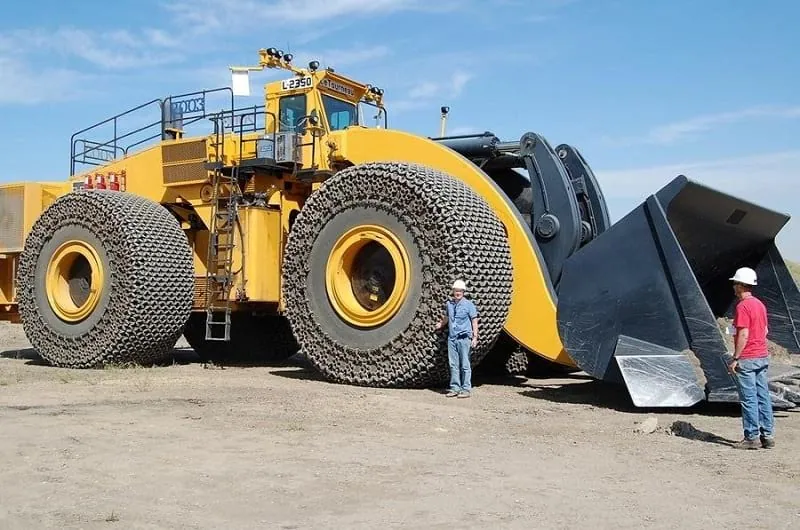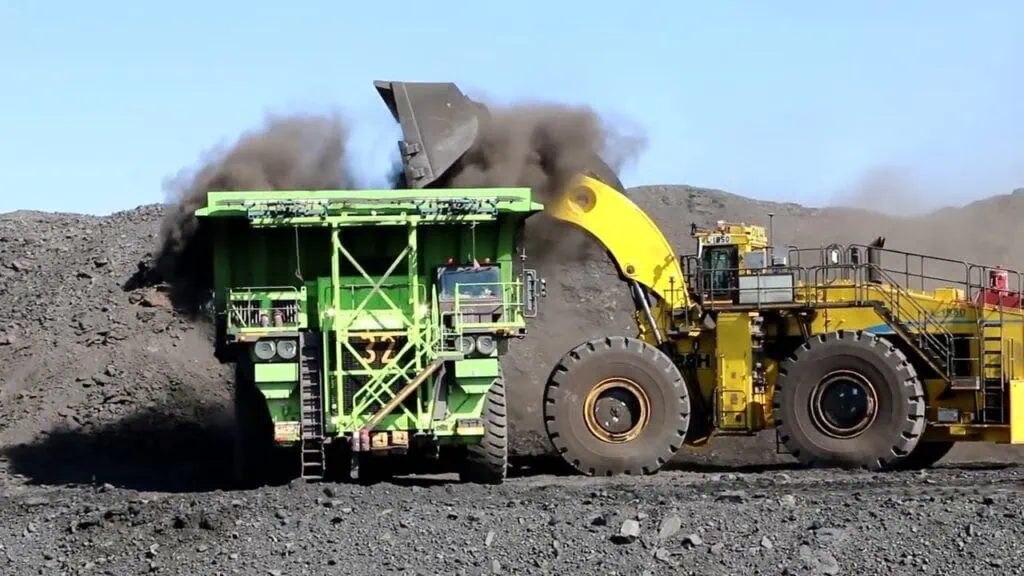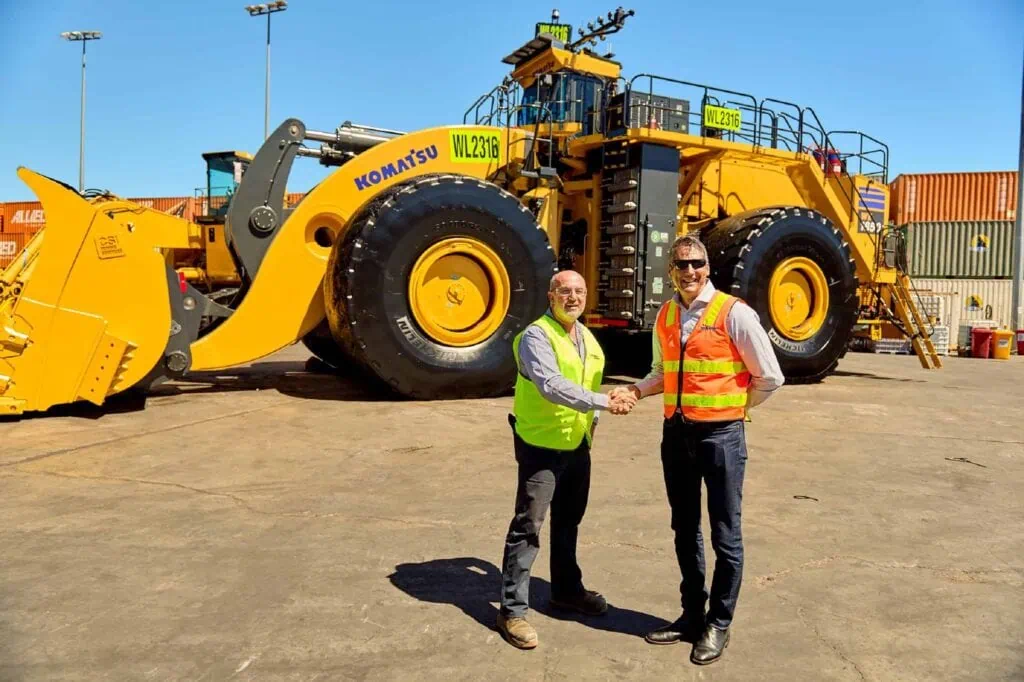Do you know which models are the largest loaders in the world? Do you want to buy one of the largest loaders for your project? Investing in the largest loader will definitely cost you a lot of money, so the risk is very high when you make a choice. If you choose the right one, it can help you greatly improve your engineering efficiency. Is it worth investing in such a large price? Read this article and let us discuss it together to help you make a decision.
In this article, we will break down the features of the biggest loader in the world, discuss the investment potential, and provide insights on whether this giant machine fits your business needs.
Let’s delve into what makes the biggest loader in the world stand out and how it is or is not a good fit for your business.

Table of Contents
Toggle1. What Are the Biggest Loaders in the World?
When it comes to investing in the largest loader in the world, you must know which models to look to, as they dominate the market for good reason. They are the biggest loader because of their size, their capabilities to move large loads, and their efficiency. Let’s go over some of the worlds’ largest loaders and what makes them unique.
Some of them include the Caterpillar 994K, Liebherr L 586 XPower, and the Komatsu WA1200-6. These are the monsters of the load-and-carry world. They are the epitome of engineering excellence and are built to tackle the toughest jobs out there.
For example, the Caterpillar 994K is a behemoth in the world of loaders, with a bucket capacity of up to 24 cubic yards. This massive loader is used in huge mining operations and construction sites that need to lift big and work fast. The Liebherr L 586 XPower is another strong contender. It is recognized for its unbelievably advanced fuel efficiency and cutting-edge technology. These machines are built to hang out with the big boys, made of tough stuff that ensures long life and reliability.
Top 3 Biggest Loaders in the World
| Loader Model | Manufacturer | Bucket Capacity | Max Load | Engine Power |
| Caterpillar 994K | Bruco | 24 cubic yards | 24 tons | 1,275 HP |
| Liebherr L 586 XPower | Liebherr | 12 cubic yards | 14 tons | 700 HP |
| Komatsu WA1200-6 | Komatsu | 10 cubic yards | 14 tons | 760 HP |
2. Investment Benefits of the Biggest Loader in the World
And if you can justify stepping up and investing in the single biggest loader on the planet, it will offer the potential to make your company much more efficient and lower your overall cost of operation. Let’s look at why.
Because of the amount of material moved with each bucket, the biggest loader in the world offers unmatched productivity. It makes fewer trips, which means a lower cost in labor to produce the same amount of work as another device. This makes it much more cost-effective over the life of the machine, especially for big projects.
The biggest thing you get when you move up is productivity. With a loader like the 994K, you can move way more material with fewer cycles. In other words, you can quickly reduce the amount of time you need to finish your project. Another benefit is that because these monster machines are all built to handle the toughest terrains and workloads, they tend to break down far less. In the case of mining or large construction projects, having a high-capacity loader allows you to get more done faster. And that’s a competitive edge.
Investment Benefits of the Biggest Loaders
| Benefit | Description | Impact on Business |
| Increased Productivity | Larger bucket capacity means fewer trips needed | Faster project completion |
| Reduced Labor Costs | Less manpower required due to machine efficiency | Lower overall costs |
| Higher Durability | Built to withstand harsh environments and heavy work | Longer machine lifespan |
| Improved Fuel Efficiency | Modern designs offer better fuel consumption rates | Reduced operational costs |

3. Challenges of Investing in the Biggest Loader in the World
There you have it. While getting a machine that large offers numerous benefits, it presents some problems. It is expensive. It takes a lot more operator skill to make it dance. And they are expensive. Plus there is the cost of maintenance and you need the skill to keep it running.
To sum it up, the cost of purchasing, maintaining and running the world’s biggest loader is a real challenge. Plus, another wrinkle is you have to have trained operators. High fuel consumption is another factor. Let’s be honest. That 994K loader burns a thousand gallons of fuel a shift. Finally, the maintenance on that thing is like medicine: they kill you with the liquid and the cure.
Another challenge that accompanies the purchase of the biggest loader in the world, according to the people who make the equipment, is the cost of purchase. These machines are not cheap. You’re talking millions of dollars. In addition to the sticker price, you have to pay to train the operator. These machines are so big and powerful that the operator has to know what they’re doing. Fuel is an essential consideration. Like a NASCAR, the bigger the loader, the more fuel it burns. Finally, someone has to maintain it. Because of the loads these machines carry and their size, they require more service. Besides, they need servicing regularly because they run so much.
Challenges of Owning the Biggest Loader
| Challenge | Description | Potential Impact |
| High Initial Investment | The upfront cost can be several million dollars | Significant financial commitment |
| Specialized Operator Training | Requires trained operators for safe use | Increased training costs |
| High Fuel Consumption | Larger machines consume more fuel | Higher operational costs |
| Frequent Maintenance | Heavy use leads to more wear and tear | Higher maintenance expenses |
4. How to Determine If the Biggest Loader Fits Your Business Needs?
All that’s left to do is decide if this monster haul truck, and the maintenance that will go with it, is good for your business.
Some of the most critical factors for determining whether a large investment in a massive loader is right for your business are the size of your operation, the types of jobs you do, and how much you have to work with for a capital investment.
Before you decide if you want to buy the biggest loader in the world, find out if it’s right for your business. For some businesses in the mining, large-scale construction, or material handling industries, they’re the perfect answer. But if you’re in a smaller business or have smaller-scale operations, the cost and scale of this machine might not be right for you. And don’t forget about the maintenance and operational costs.
Factors to Consider Before Investing in the Biggest Loader
| Factor | Consideration | Why It’s Important |
| Business Scale | Is your operation large enough to justify such a machine? | Helps determine ROI potential |
| Project Type | Are your projects heavy-duty and high capacity? | Matches machine capabilities |
| Budget | Can your company afford the upfront and ongoing costs? | Financial viability check |
| Maintenance and Training | Are you prepared for the additional training and upkeep? | Ensures long-term machine performance |

5. How Much Does the Biggest Loader Cost?
The biggest thing to consider before you start spending money on the biggest loader in the world is how much it costs. Knowing the price range of these machines is essential.
The price of the biggest loader in the world can vary dramatically based on the model, features, and manufacturer. Plan to spend more than several million dollars for these massive loaders.
For instance, the Caterpillar 994K, one of the largest loaders in the world, has an estimated purchase price of around 4million,depending on the specification figuration you choose.Other loaders like the LiebherrL586X Power and Komatsu WA1200−6 might cost a smidgeless but are still right there in the 4million,depending on the specification figuration you choose.Other loaders like the LiebherrL586X Power and Komatsu WA1200−6might cost a smidgeless but are still right there in the 2.5 to $3 million range. You pay for the advanced technology, durability, and power of these monsters. As you think about the cost, don’t forget to include financing options, maintenance contracts, and fuel costs over the life of the machine.
Price Range of the Biggest Loaders
| Loader Model | Estimated Price Range | Note |
| Caterpillar 994K | $3.5 – $4.5 million | High performance and durability |
| Liebherr L 586 XPower | $2.5 – $3.5 million | Fuel-efficient and powerful |
| Komatsu WA1200-6 | $2.8 – $3.2 million | Known for reliability and strength |
6. What Is the Biggest CAT Loader in the World?
Caterpillar has always been a leader when it comes to heavy machinery, and their biggest loader, the Caterpillar 994K, is one of the most powerful loaders in the world.
The CAT 994K is the big CAT loader, designed to move a lot of material. It can handle up to 24 tons of material because it is designed for high-volume operations like mining and large construction projects.
The Caterpillar 994K, the largest loader in the world-onion by CAT, is unique because it combines incredible capacity with fuel efficient technology. Powered by a 1,275 horsepower engine, this machine can handle a bucket full of material that weighs up to 24 tons. The 994K was designed for efficiency and long-term durability. Its hydraulic system is state-of-the-art, providing max lifting power to the bucket, even under extreme conditions. You can find this machine in some of the world’s largest mining operations because its size and capability make it a must-have there.
Caterpillar 994K Key Specifications
| Feature | Specification |
| Engine Power | 1,275 HP |
| Bucket Capacity | 24 tons |
| Operating Weight | 220 tons |
| Maximum Reach | 12 meters |

7. What Is the Biggest Haul Truck in the World?
If you’re looking at the biggest loader in the world, we need to look at haul trucks. These trucks will help you move the vast amounts of material you are plucking out of the earth. Let’s take a look at the biggest haul trucks in the world.
The biggest truck, the BelAZ 75710 makes all the other trucks look tiny. This dump truck has a payload capacity of 450 tons. When you’re using the biggest loader in the world, you need the biggest truck to carry all that dirt.
The BelAZ 75710 is the most potent capacity haul truck in the world. Capable of carrying 450 tons in a single haul, this truck is essential to large mining operations where it transports material excavated by loaders like the Caterpillar 994K. The 450-ton truck combines with the 2,905-horsepower loader to make running some of the planet’s largest mining operations possible.
Biggest Haul Trucks in the World
| Truck Model | Manufacturer | Payload Capacity | Engine Power |
| BelAZ 75710 | BelAZ | 450 tons | 2,300 HP |
| Komatsu 980E-4 | Komatsu | 400 tons | 2,700 HP |
| Caterpillar 797F | Bruco | 400 tons | 2,650 HP |
8. How Does the Biggest Loader Impact Operational Efficiency?
The biggest loader in the world isn’t just about moving material; it has the ability to transform the efficiency of an entire operation. It doesn’t matter if you’re in a mining pit or working on a large construction site; these machines are game-changers.
It goes without saying, these loaders with their massive bucket capacities and powerful engines cut down significantly on the time needed to move material, improving the overall efficiency of the operation.
By using the biggest loader in the world, a business can drive down the number of cycles it takes to move material. This, in turn, equates to fewer hours of operation, which means less fuel consumed to move material. For large mining operations, the Caterpillar 994K is the biggest loader, and with its 24-ton bucket capacity, they make fewer trips and load faster. This means the mine can run faster, get material moved quickly, and ultimately finish the project faster and with more production. This speed can make the difference in project deadlines and final project costs.
By reducing the time it takes to complete each cycle, these companies can move more material in less time, giving them an advantage over their competitors in an industry where time is money.
How the Biggest Loader Affects Operational Efficiency
| Efficiency Factor | Impact | Resulting Benefit |
| Fewer Material Handling Cycles | Larger bucket means fewer trips required | Increased speed and productivity |
| Lower Fuel Consumption | More material moved per cycle, less fuel needed | Reduced fuel costs |
| Faster Project Completion | Less downtime and faster loading times | Shorter project timelines |
| Enhanced Machine Durability | Less wear and tear due to optimized operations | Longer machine lifespan |

9. How Does the Biggest Loader Contribute to Sustainability?
Sustainability also increasingly plays a role in the heavy machinery space, and the biggest loader in the world helps to reduce the environmental impact of massive operation sites.
For as much energy as these large machines usually consume, the largest loaders now boast improved fuel efficiency and less environmental impact.
For their brute size, modern loaders like these are built with fuel efficiency in mind. Loaders, like the Caterpillar 994K and the Liebherr L 586 XPower, do everything in their design, short of the hybrid loader we’re about to discuss, to reduce fuel consumption and lessen their impact on the environment. They have technologies like fuel-saving engines, optimized hydraulics, and regenerative braking, which can slow them a bit faster through fleets. Many of these loaders are built to run cleaner by spewing fewer emissions into the atmosphere, helping companies comply with EPA emission requirements. The Caterpillar 994K even uses an advanced engine management system, which both burns less fuel and gives you more power.
As sustainability becomes more of an issue in business operations (and everything we do), finding and purchasing a loader that’s fuel-efficient and produces fewer emissions make sense not only for the environment but also because it’s the right thing to do.
Sustainability Features in the Biggest Loaders
| Loader Model | Sustainability Feature | Environmental Impact |
| Caterpillar 994K | Fuel-saving engine technology | Reduced emissions, fuel efficiency |
| Liebherr L 586 XPower | Regenerative braking system | Lower energy consumption |
| Komatsu WA1200-6 | Optimized hydraulics for efficiency | Reduced operational costs |

10. What Are the Long-Term Maintenance Considerations for the Biggest Loader?
However, maintenance is essential to making sure the biggest loader in the world stays the biggest loader in the world and productive. Know what it will take to keep the biggest loader in the world running long-term. Figure this into the cost of ownership to squeeze that machine as tight as you can while getting the most life out of it. How much and how well you maintain the machine will be the most significant factor in how productive your machine stays as long as you own it.
Investing in the biggest loader requires careful attention to its maintenance needs, including regular inspections, parts replacements, and addressing wear and tear issues early.
The sheer size and complexity of the biggest loader in the world means that regular maintenance is necessary to keep it operating at peak performance. This includes checking hydraulic systems, replacing worn-out tires or tracks, and ensuring the engine remains in good condition. For example, the Caterpillar 994K requires frequent inspections of its advanced hydraulic systems and regular engine servicing to prevent overheating and improve fuel efficiency. Over time, components like bucket teeth, hydraulic cylinders, and transmission parts will need to be replaced. If not regularly serviced, even the biggest loaders can face downtime, which can result in delayed projects and additional repair costs.
Proper maintenance schedules, along with high-quality replacement parts, are essential to ensuring the loader runs efficiently for years.
Long-Term Maintenance Considerations for the Biggest Loaders
| Maintenance Task | Recommended Frequency | Reason for Maintenance |
| Hydraulic System Check | Every 500 operating hours | Prevents leaks and improves efficiency |
| Tire or Track Replacement | Every 1,000 operating hours | Ensures mobility and reduces wear |
| Engine Inspection | Every 200 operating hours | Prevents overheating and fuel inefficiency |
| Bucket Teeth Replacement | Every 1,000 operating hours | Ensures optimal material handling |
| Transmission Servicing | Every 1,500 operating hours | Ensures smooth operation and reduces wear |
Conclusione
In conclusion, the biggest loader in the world is a powerful investment that offers significant benefits in terms of productivity, sustainability, and operational efficiency. However, businesses must carefully consider their specific needs, budget, and long-term maintenance requirements before making such a significant investment. Whether your focus is on minimizing downtime, improving fuel efficiency, or reducing environmental impact, these loaders can help businesses achieve their goals. With the right maintenance and operational strategy, the biggest loader can provide unparalleled service, delivering value for years to come. Contact with us for more information!